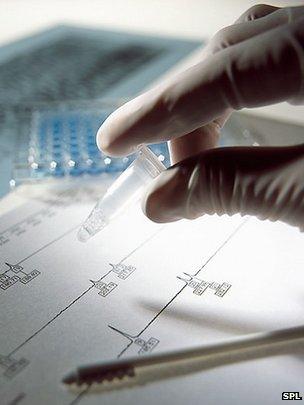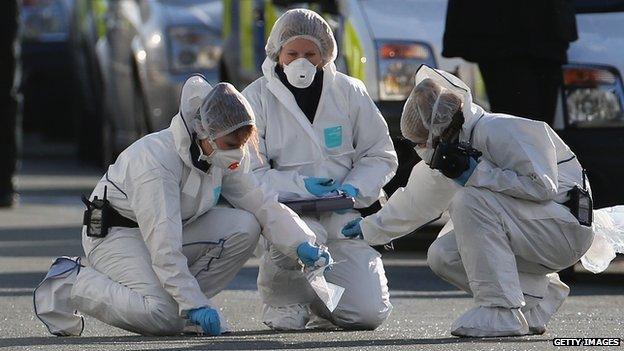DNA crime-fighting in UK 'lagging behind', experts say
- Published

Forensic science is currently being scrutinised by a select committee inquiry
Cross-border co-operation on terrorism and crime will be compromised unless the UK updates the technology it uses for DNA profiling, experts have warned.
The country where the technique was developed now lags behind almost all European countries, which use newer processes to handle crime samples.
But a decision to destroy millions of stored DNA samples could complicate any effort to upgrade systems.
A select committee is hearing evidence on the state of UK forensic science.
The EU has recommended, external that member states adopt a standard set of 12 genetic markers - or loci - called the European Standard Set (ESS), external.
The large number of profiles held in different European databases that could potentially be compared necessitated standardisation, and an increase in the number of markers used to match them.
One purpose of the ESS was to reduce the potential for chance, or adventitious, matches between unrelated individuals. If investigators are comparing profiles generated using different sets of markers, there might not be enough of them in common to exclude such adventitious matches.
The timeline for implementation has now passed. Information obtained by the BBC shows that of 15 European countries for which data is available, the UK is one of four that has not upgraded to the recommended marker set.
Experts also say that the "chemistry" that underlies DNA testing kits used by UK forensic science labs is now more than a decade old and that newer, more sensitive systems can obtain results from even low quality samples - improving success rates. Some argue that such information can potentially make or break a case.
Data compiled by kit manufacturer Promega, external shows that 20 European countries are using so-called "next generation" systems (the list includes technologies manufactured by Promega and by rival companies).
"[The] UK is currently locked into outdated technology that is more than 10 years old. This means that cases will not be analysed using best practice methods," said Prof Peter Gill, an expert in forensic DNA, from the University of Oslo, Norway.
In his evidence to the inquiry, Prof Gill added: "Cross-border comparisons with other countries will be compromised since the systems in use will no longer be entirely comparable."
Peter Schneider, who leads the European Forensic Genetics Network (Euroforgen), also stressed the urgency of upgrading to new systems.
The professor, who is based at the Institute of Legal Medicine at the University of Cologne, Germany, told BBC News: "When you start to combine and compare very large data-sets within and between countries, seven markers might not be enough to exclude adventitious matches."
Prof Sir Alec Jeffreys, who - with Prof Gill and Dave Werrett - pioneered the technique of DNA fingerprinting, has previously argued, external that the "consequences of even one false match leading to a conviction that was subsequently overturned could be severe for the DNA database and its public acceptability".
A Home Office spokesperson told BBC News: "The single DNA test kits currently used in the UK mean matches can be reported immediately, allowing crimes to be solved and prolific offenders brought to justice more quickly. Techniques already used in serious cases are as sensitive, if not more sensitive, than those being proposed.
"While we recognise this new profiling technology has benefits, its introduction needs to be handled carefully to ensure it does not compromise the integrity of our existing forensic DNA techniques."
Sample disposal
UK experts fear that proposals to destroy so-called "second swab" DNA samples could slow down investigations if and when the UK moves over to new markers and chemistries. Currently, when a DNA sample is obtained from a suspect, a first swab is used to generate a profile in the NDNAD and a second sample is placed into storage.
Problems could arise when there was a partial match between a crime scene stain processed using the new markers and an old profile in the database generated using six or 10 markers.
Up until now, it would have been possible to re-process the DNA from the second swab, allowing investigators to confirm or deny a match using a comparison based on all the new loci. But soon, that will no longer be an option.

Since the closure of the Forensic Science Service, casework is carried out by private firms or by police in-house scientists
Dr Chris Maguire, from the Northumbria University Centre for Forensic Sciences (NUCFS), said: "If you change your system to one of the new European standard marker sets, and you have a crime stain with a match in [the old system] and you want to upgrade it - what do you do?
"You've got to go and find the individual and ask them for another sample, instead of just going to the second swab, re-processing it and confirming it." This will involve re-interviewing the suspect and could interfere with certain investigations, tipping off individuals that they are being scrutinised.
Dr Sue Pope, from Principal Forensic Services, agreed: "The effect will be that upgrading to the ESS system will require taking another sample, with obvious costs," she explained.
Court ruling
The issues were brought to light by a legal case in which the European Court of Human Rights ruled that holding DNA samples from individuals who have been arrested but are later acquitted or have charges dropped against them is a violation of the right to privacy - an outcome that was backed by civil liberties campaigners.
The UK's new Protection of Freedoms Act 2012, external allows DNA samples to be stored for a maximum of six months before they are destroyed. But some forensic scientists say this is too restrictive.
A Home Office document from January 2011, shows that there were also cost-savings to be made, external by no longer maintaining the samples in freezers - and some six million are now to be disposed of.
The destruction of the swabs is also likely to hamper a forensic technique that has been successfully applied in the UK, known as familial searching, said Dr Maguire. This involves searching for close, though not exact, matches in the DNA database, in the knowledge that such hits could represent family members of a suspect.
Using the second swabs to test for additional markers on the Y (male) chromosome, can help narrow a large pool of close matches - potentially thousands of profiles - to a more manageable number.
A Home Office spokesperson said: "For too long we failed to collect the DNA of prisoners while still retaining information about people who were arrested but never charged. We are now taking steps to ensure that we no longer retain the DNA and fingerprints of innocent people.
"Through the Protection of Freedoms Act we are protecting the privacy and human rights of the public while keeping them safe from crime by ensuring the right people are on DNA databases."
The House of Commons science and technology committee is conducting an inquiry into the impact of closing the Forensic Science Service (FSS) which analysed crime scene evidence in England and Wales. The FSS was shut down by the government in March last year, with the intention that private providers would expand to fill the gap.
- Published25 January 2013
- Published31 August 2012